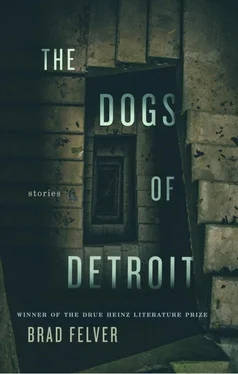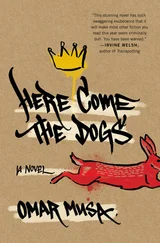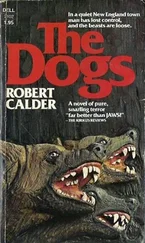“I’m serious.”
“I am too,” she said. “It would make me feel thinner. I gain weight like a normal person but you just keep on looking like some teenage bronco rider.”
Years later, when she emptied the trash bin in his workshop, she found dozens of empty Archway cookie packages. At first she was terribly confused—he had virtually no sweet tooth to speak of—and only after some thought did she remember.
Annabelle started preschool, and suddenly every wall in the house grew crowded with crayon artwork. Their friends became the parents of Annabelle’s classmates, their free time split between swimming lessons and playgrounds and the zoo. Ruth took a position as an office manager for a pet food distributor. Gus began selling a few more desks, working late rehabbing grand staircases in Cleveland Heights and Willoughby and Hudson. They bought an old Craftsman home with pipes that knocked when they flushed toilets. They put rugs over the old oak floors and let Annabelle chase them from room to room while she screamed like a Viking. Blanket forts dominated their living room for weeks at a time. They raked leaves and jumped in the piles. They became experts about dinosaurs and then sea shells and then paper airplane design.
Without noticing it, they had created an entire country with its own language and customs and mythologies and even defensive perimeters. Their own lines allowed few breaches. Their country was complete on its own. A wide world existed beyond their borders, they could still hear its bustling chaos, but they were content to ignore it and to be ignored in kind.
The doctors found the tumor in Annabelle’s brain when she was four years old. It was the size of a robin’s egg, malignant, and needed to come out.
“But you can do surgery, can’t you?” Ruth asked.
“We’re not sure yet,” the doctor said. That phrase— We’re not sure yet —became an oft-heard refrain through months of consultations, and they learned it had a very specific meaning: We are quite sure, and it’s bad news .
They saw specialists in a dozen cities: Pittsburgh, Orlando, Denver, Los Angeles, Toronto. Ruth was ferocious in her research, in her preparation for each appointment, bringing with her pages of questions that she asked like accusations. The numbers gave her something to focus on, though quantifying bad luck in such a way also made her want to murder the universe.
“Do you know the odds of this happening?” Ruth asked one time. “Sixty-eight million to one,” she said. “Sixty-eight million.”
Gus looked down at her legal pad, the scratches and strange symbols, Greek or Latin, perhaps. He sometimes forgot about her imposing mathematical pedigree, which now became a prison, intellect stunting emotion. What was the point of calculating probabilities or the effects of random elements? Gus wanted to know. They were here already. These calculations served only to make him feel like a helpless victim. What he didn’t understand, of course, was that they allowed Ruth a respite, precious moments of cold, abstract thought. Through them, she could quarantine her despair so that it would not pollute everyone around her.
They drove to Boston to see a specialist her father had known at Mass General. She was from Mumbai and had a long name that Gus could not pronounce. The doctor paged through Annabelle’s chart, frowning and shaking her head without speaking. When she finally looked up, she smiled at them, but it was the kind of smile offered to a dear friend at a funeral.
“No more bad news,” Ruth said.
This specialist was aiming to lead a trial of an experimental treatment that involved first inducing a coma and then utilizing a special cocktail of drugs that would, perhaps, target the ravenous tumor.
“She’s a good candidate, isn’t she?” Ruth asked, not completely a question.
The doctor leaned in with a bowl of candy and told Annabelle to take as much as she could hold. Ruth realized then that this doctor had done this many times, was as expert in delivering bad news as she was in the operating room.
“I won’t presume to understand what you are going through,” she said. She spoke with that peculiar British Indian accent, which Ruth decided meant she had likely been educated at Cambridge or Oxford. “My father was a particle physicist and my mother died when I was a teenager. He could be a harsh man, largely devoid of human sentiment. He forbade me grieving over my mother’s death because he believed there was no reason, scientifically speaking, to do so. According to the law of conservation of mass, she was still with us. Mass cannot be created or destroyed, of course. In fact, he pointed out, the very atoms from my mother’s body were now repurposed in our own bodies. This is true of every human who has ever lived. Every human currently alive is composed of the very atoms of every person who has ever lived. Every person! Billions of atoms from each person. Can you imagine? A billion atoms that make me a person once made Shakespeare a person, and Cleopatra and Gandhi and Einstein.”
“Also Hitler and Stalin,” Ruth said. “Genghis Khan, Oliver Cromwell, Caligula, Attila, Jeffrey Dahmer.”
“Ruth.”
The doctor ignored this and handed Annabelle another sucker.
“So, scientifically speaking,” Ruth said, “we cannot be sad.”
“Ruth,” Gus said, more pleading than scolding.
“Well,” the doctor said but then said nothing else.
Gus insisted on making the casket himself, long hours alone in the workshop, and he was unable to see the strange selfishness of this. It was a refuge he refused to share with her. He fixated most on the casket dimensions, hardly larger than a laundry basket.
“Why are you punishing yourself like this?” Ruth asked.
“She’ll be in there forever.”
“Come home,” she said, but he had already gone back to work.
They couldn’t even hold hands at the funeral or feign unity at the wake. They each faced the same choice at this moment—anger or sadness—and each opted for anger. Perhaps this was not a conscious decision. The world had drained them of compassion until no residue remained. Anger seemed easier, cleaner, almost tangible. But in the coming years, each of them would look back at this time, searching for the precise moment they pivoted away from each other, because if they could isolate the fulcrum, the singularity, perhaps some wormhole would sprout and revive a conduit to the past.
Ruth said awful things and then felt horrible about them, but then she would say more awful things. It was an addiction she could not kick, as if discarding her grief and forcing him to bear it instead. You can’t play ukulele and fix this, you know. You always wanted a boy anyway. She’ll never need one of your desks now .
If Ruth said awful things, Gus said nothing at all. He retreated to the farm, to the workshop, where he could easily make her feel like an interloper. He spent whole days there, while Ruth sat at home, waiting for him to return to her, though he never truly did. She began to spend weekends in Boston. For months they lingered on this way, trapped in a stalemate.
Ruth appeared at the workshop one afternoon. Gus had been mindlessly sanding the tapered legs of a desk for several hours, his arm ached from it, and as he stood to look at his work, he realized he had sanded so much that the third leg was now noticeably thinner than its counterparts.
Ruth sighed. “I need a break.”
“Me too,” he said.
“From you. From all of this. I don’t expect you to understand.”
Gus dropped the sanding block, and it rattled on the concrete floor.
“Do you have to act like this?”
“How am I acting?”
“Like the spoiled little rich girl.”
Читать дальше












